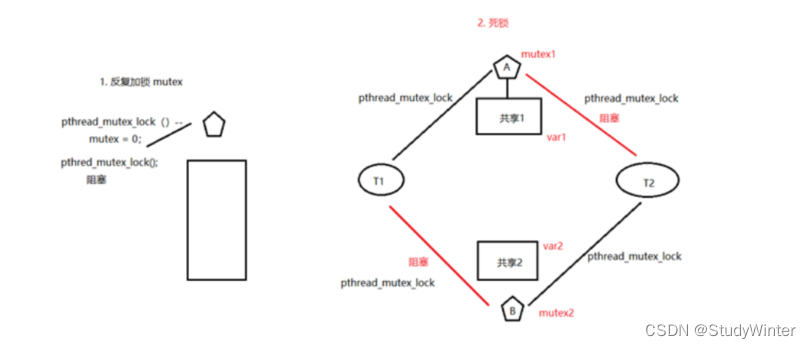与互斥量类似,但读写锁允许更高的并行性。其特性为: 写独占,读共享。
1 读写锁状态
特别强调: 读写锁只有一把, 但其具备两种状态:
1 读模式下加锁状态 (读锁);
2 写模式下加锁状态 (写锁) 。
2 读写锁特性
1 读写锁是“写模式加锁”时, 解锁前,所有对该锁加锁的线程都会被阻塞;
2 读写锁是“读模式加锁”时, 如果线程以读模式对其加锁会成功;如果线程以写模式加锁会阻塞;
3 读写锁是“读模式加锁”时, 既有试图以写模式加锁的线程,也有试图以读模式加锁的线程。那么读写锁会阻塞随后的读模式锁请求。优先满足写模式锁。 读锁、写锁并行阻塞, 写锁优先级高 。
读写锁也叫共享-独占锁。当读写锁以读模式锁住时,它是以共享模式锁住的;当它以写模式锁住时,它是以独占模式锁住的。 写独占、读共享。读写锁非常适合于对数据结构读的次数远大于写的情况。
主要函数
pthread_rwlock_t rwlock;
pthread_rwlock_init(&rwlock, NULL);
pthread_rwlock_rdlock(&rwlock); // try
pthread_rwlock_wrlock(&rwlock); // try
pthread_rwlock_unlock(&rwlock);
pthread_rwlock_destroy(&rwlock);以上函数都是成功返回0,失败返回错误号。
(1)pthread_rwlock_init 函数
初始化一把读写锁
pthread_rwlock_t rwlock;
// 方法1
int pthread_rwlock_init(pthread_rwlock_t *restrict rwlock,
const pthread_rwlockattr_t *restrict attr);
// 参 2: attr 表读写锁属性,通常使用默认属性, 传 NULL 即可
// 方法2
rwlock = PTHREAD_RWLOCK_INITIALIZER;(2)pthread_rwlock_destroy 函数
销毁一把读写锁
int pthread_rwlock_destroy(pthread_rwlock_t *rwlock);(3)pthread_rwlock_rdlock 函数
以读方式请求读写锁。(常简称为:请求读锁)
int pthread_rwlock_rdlock(pthread_rwlock_t *rwlock);(4)pthread_rwlock_wrlock 函数
以写方式请求读写锁。(常简称为:请求写锁)
int pthread_rwlock_wrlock(pthread_rwlock_t *rwlock);(5)pthread_rwlock_unlock 函数
解锁
int pthread_rwlock_unlock(pthread_rwlock_t *rwlock);(6)pthread_rwlock_tryrdlock 函数
非阻塞以读方式请求读写锁(非阻塞请求读锁)
int pthread_rwlock_tryrdlock(pthread_rwlock_t *rwlock);(7)pthread_rwlock_trywrlock函数
非阻塞以写方式请求读写锁(非阻塞请求写锁)
int pthread_rwlock_trywrlock(pthread_rwlock_t *rwlock);3 两种死锁
是使用锁不恰当导致的现象:
1. 对一个锁反复lock。
2. 两个线程,各自持有一把锁,请求另一把。

4 读写锁案例
#include <stdio.h>
#include <stdlib.h>
#include <string.h>
#include <unistd.h>
#include <pthread.h>
// 全局共享资源
int counter;
// 全局读写锁,初始化
pthread_rwlock_t rwlock;
// rwlock = PTHREAD_RWLOCK_INITIALIZER;
// 任务:3个线程不同时写同一资源,5个线程不同时读同一资源
// 写
void *do_write(void *arg)
{
int t = 0;
int i = (int)arg;
int res = 0;
while (1)
{
// 加锁,写锁独占
res = pthread_rwlock_wrlock(&rwlock);
if (res != 0)
{
fprintf(stderr, "pthread_rwlock_wrlock error:%s\n", strerror(res));
exit(1);
}
t = counter;
usleep(10000);
// 修改就是写
printf("------write:%d, %lu, counter = %d, ++counter = %d\n", i, pthread_self(), t, ++counter);
// 解锁
res = pthread_rwlock_unlock(&rwlock);
if (res != 0)
{
fprintf(stderr, "pthread_rwlock_unlock error:%s\n", strerror(res));
exit(1);
}
usleep(10000);
}
return NULL;
}
// 读
void *do_read(void *arg)
{
int res = 0;
int i = (int)arg;
while (1) {
// 加锁,读共享
res = pthread_rwlock_rdlock(&rwlock);
if (res != 0)
{
fprintf(stderr, "pthread_rwlock_rdlock error:%s\n", strerror(res));
exit(1);
}
usleep(10000);
// 修改就是写
printf("==========================================read:%d, %lu, counter = %d\n", i, pthread_self(), counter);
// 解锁
res = pthread_rwlock_unlock(&rwlock);
if (res != 0)
{
fprintf(stderr, "pthread_rwlock_unlock error:%s\n", strerror(res));
exit(1);
}
usleep(10000);
}
return NULL;
}
int main(int argc, char **argv)
{
int i;
// 8个线程
pthread_t tid[8];
// 初始化读写锁
int res = pthread_rwlock_init(&rwlock, NULL);
if (res != 0)
{
fprintf(stderr, "pthread_rwlock_init error:%s\n", strerror(res));
exit(1);
}
// 初始化线程
// 写线程
for (i = 0; i < 3; i++)
{
res = pthread_create(&tid[i], NULL, do_write, (void *)i);
if (res != 0)
{
fprintf(stderr, "pthread_create write error:%s\n", strerror(res));
exit(1);
}
}
// 读线程
for (i = 3; i < 8; i++)
{
res = pthread_create(&tid[i], NULL, do_read, (void *)i);
if (res != 0)
{
fprintf(stderr, "pthread_create read error:%s\n", strerror(res));
exit(1);
}
}
// 回收子线程
for (i = 0; i < 8; i++)
{
res = pthread_join(tid[i], NULL);
if (res != 0)
{
fprintf(stderr, "pthread_join error:%s\n", strerror(res));
exit(1);
}
}
// 销毁读写锁
res = pthread_rwlock_destroy(&rwlock);
if (res != 0)
{
fprintf(stderr, "pthread_join error:%s\n", strerror(res));
exit(1);
}
return 0;
}执行

程序输出飞快,随便截个图,如上图。
由于读共享,写独占。写锁优先级高。前面5个read一定先于后面的write到达的,不然write会抢到锁先进行写操作。






















 1360
1360











 被折叠的 条评论
为什么被折叠?
被折叠的 条评论
为什么被折叠?








